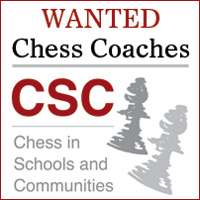
Latest Information
Home
How to Enter
2010/11 dates
Fixtures
Hotels
Rules
Team Captains
Current Teams
Registrations
Teams wanted
Division 1
Division 2
Division 3
Junior 4NCL
Live games
Reports
English Chess Forum
Previous Winners
Photo Gallery
Press Info
News Archive
New to the 4NCL
Downloads
Chess Monthly
Useful Links
Management Board
Arbiters
Appeals Committee
Site Index
FAQ
Email us
The Four Nations Chess League does not accept responsibility for the content of other websites, to which this site links.
This website includes information on participants in the Four Nations Chess League in respect of name, grade, title, nationality and sex (team registration lists), as well as telephone number(s), email address(es) and postal address(es) in certain circumstances (team captains/managers, management board members, arbiters etc). Participants wishing this information not to be included on the website should contact the webmaster to have it removed, but should be aware that in this event they will not be permitted to play in the league.
|
Bristol 4NCL Report
by Jack Rudd
|
Bristol 1 v Guildford 2
Charles Cobb 2406 0 John Shaw 2433 IM 1
Chris Beaumont 2329 0 Graeme Buckley 2420 IM 1
Simon Buckley 2314 0 David Howell 2340 FM 1
James Sherwin 2303 ½ Paul Cooksey 2248 ½
Jack Rudd 2281 0 Ian Thompson 2235 FM 1
David Buckley 2223 1 Matthew Anderton 2233 0
Jesper Sisask 2166 1 Keith Richardson 2220 0
Poppy Aarons 1871 0 Heather Lang 2068 1
Bristol 1 2½-5½ Guildford 2
Oops. This was a match we came into fairly hopeful of our chances of winning, although we were weakened by Ann-Marie's absence. Unfortunately, it was not to be. My game was the first to finish (which I'm sure will shock and astound you all); I allowed my opponent a seemingly harmless open file, and the advantage he got from it eventually proved decisive. David Buckley immediately responded, levelling for us with his second win of the season.
The remaining games looked to be in the balance, but they gradually swung Guildford's way. Poppy made a blunder in what I think was a winning position and lost, Simon allowed a nasty little ...h4 move in a Tromp and got into serious trouble from his opponent's bishops, and Charles, who had turned up late (see earlier comments about shock and astonishment) got into very nasty time-trouble in a complex position, whose problems he could not solve in his remaining time.
Paul Cooksey then sealed the match for Guildford by finding a perpetual check against Jim Sherwin, after which Jesper raised our score to mildly respectable levels by winning a nice game against Richardson. Finally, Chris Beaumont's minor-piece ending, in which he had had winning chances for a long time, was settled in his opponent's favour when Chris's knight got trapped.
Bristol 2 v Perceptron Youth
Paul Helbig 2184 ½ Thomas Rendle 2303 ½
David Collier 2168 0 Rafe Martin 2266 FM 1
Stephen Dilleigh 2161 0 Andrew Bigg 2263 1
John Curtis 2126 0 Chris Dorrington 2194 1
Alex Easton 2095 0 William Bennett 2119 1
David Bareham 2115 1 Thomas Eckersley-Waites 2114 0
Toby Stock 2090 0 Adam Eckersley-Waites 2072 1
Monica Vann 113 ½ Naomi Miller 2038 ½
Bristol 2 2-6 Perceptron
And this one started so well, as well. David Bareham got in a nice queen sacrifice against Tom Eckersley-Waites, and then Monica Vann picked up her first points for Bristol with some stubborn defence against Miller. The rest, however, was depressing stuff. I didn't see most of it, concentrating instead on the first-team match, and a number of the games never looked like getting us much, but Alex and Toby both seemed to have had good positions that somehow went their opponents' way. At the end, Steve was left trying to defend with Q v Q and RP, but his opponent's technique was just too good.
Guildford 1 v Bristol 1
Mark Hebden 2550 GM 1 Charles Cobb 2406 0
Jonathan Rowson 2577 GM 1 James Sherwin 2303 0
Daniel King 2517 GM 1 Jack Rudd 2281 0
Joe Gallagher 2543 GM 1 Chris Beaumont 2329 0
Jonathan Plaskett 2490 GM ½ Simon Buckley 2314 ½
Alexander Cherniaev 2509 GM 1 David Buckley 2223 0
Nigel Povah 2377 IM 1 Jesper Sisask 2166 0
Susan Lalic 2364 WGM 0 Ann-Marie Ashby 2105 1
Guildford 1 6½-1½ Bristol 1
Well, yes. This lot are the reigning champions and had six GMs and two IMs playing. It became clear from the start that we were on for a flattening. David sacrificed the exchange for an attack that didn't work, and his position crumbled completely when his opponent forced the queens off. Chris was the next to finish; he was seen afterwards wondering exactly where he went wrong. Then Mark Hebden made it 3-0 by beating Charlie; I didn't see much of the game, but when the dust had settled, white had an extra piece.
Simon put us on the scoresheet by drawing with Plaskett, although later analysis revealed he should actually have won. The match was, however, settled when Povah, who had had a positional advantage all game, crashed through against Jesper's king.
That left three very long, very hard-fought games still going. I had made a positional sacrifice of a piece for two pawns at move 14; at move 75 I eventually had to admit defeat in the unusual 2Ns+P v B ending. Then Ann-Marie pulled off one of the giant-killings of the round with a win against Susan Lalic. This left Jimmy battling on against Rowson until about five o'clock, but eventually the British Champion managed to find a way to break through and win.
White Rose 1 v Bristol 2
Angus Dunnington 2386 IM ½ Paul Helbig 2184 ½
Peter Gayson 2256 0 David Collier 2168 1
David Adams 2207 1 Stephen Dilleigh 2161 0
Paul Hutchinson 2191 1 John Curtis 2126 0
Jim Burnett 2188 ½ Alex Easton 2095 ½
Steve Barrett 2181 1 David Bareham 2115 0
Peter Shaw 2125 1 Toby Stock 2090 0
Guo Xi-Yang 1885 1 Poppy Aarons 1871 0
White Rose 1 6-2 Bristol 2
My 75-move epic meant I had even less time to watch this match than I had the previous day's. I saw Poppy get into horrible trouble early on, losing two pieces for a rook, and she lost quite quickly. When I next came up, three other members of our team had also done so, putting the match effectively beyond reach. But credit should be given to Paul and Dave for their fine results against higher-rated players, and also for Alex for managing to draw what looked like a hopeless position.
By my reckoning, the second team will probably need to win more matches than they lose in their remaining seven to stay up. With Barbican 2 and Slough Sharks 1 still to play, we need all the luck we can get.
Games
[Event "4NCL/D1/BRI1-GUI2"]
[Site "West Bromwich ENG"]
[Date "2004.11.20"]
[Round "3.6"]
[White "Anderton, Matthew N"]
[Black "Buckley, David E"]
[Result "0-1"]
[ECO "B06"]
[WhiteElo "2233"]
[BlackElo "2223"]
[PlyCount "82"]
[EventDate "2004.11.20"]
[SourceDate "2004.09.21"]
1. e4 d6 2. d4 g6 3. Nc3 c6 4. Be3 Bg7 5. Qd2 b5 {An interesting start to this opening. Both sides are refusing to commit themselves to any particular kingside development, and instead focusing on the other wing.} 6. Bd3 Nd7 7. a4 b4 8. Nce2 a5 9. Nf3 Ngf6 {The alternative would be a hippo-like formation with e6 and Ne7.} 10. Bh6 O-O 11. Bxg7 Kxg7
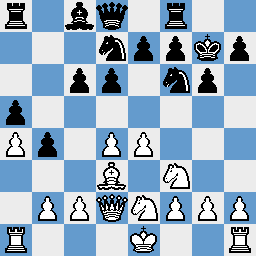
12. e5 {White decides to open up the centre before black can play e5 himself. A bold, but risky choice - the pawn is exposed on e5, and black's minor pieces get several good squares.} dxe5 13. dxe5 Nd5 14. h4 h5 15. Ned4
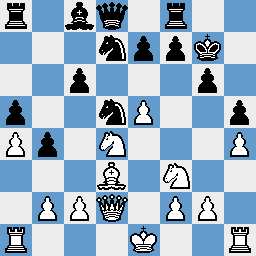
Nc5! {Black correctly sees e6 as a bigger threat than Nxc6, and so gives up the pawn.} 16. Nxc6 Nxd3+ 17. Qxd3 Qd7 18. Ncd4 Nf4 19. Qd2 {White can't hang on to the pawn without sticking the queen on f1 and then g1, and black then has so much compensation it doesn't really matter.} Nxg2+
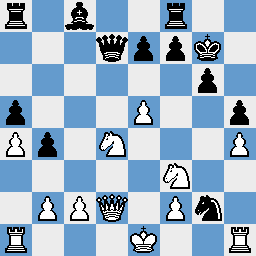
20. Kf1? {It looks obvious to attack the knight, but the king winds up far too exposed here. It should have gone to d1, where black will find it much harder to attack.} Qg4 21. Qg5 Ba6+ 22. Kg1 Nf4+ 23. Kh2 (23. Qxg4 hxg4 24. Ng5 Rfd8 25. c3 (25. Rd1?? Rxd4) bxc3 26. bxc3 Rac8 -+) Bb7! {Forcing a good queen exchange.} 24. Qxg4 hxg4 25. Kg3 Ne2+ 26. Nxe2 Bxf3 27. Rhe1 Rfd8
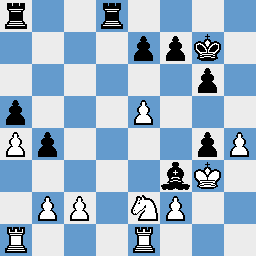
{The dust has settled, and we can see black's advantage. The black rooks are going to pour in, as white cannot contest the d-file immediately.} 28. Ng1 {(=)} 28... Rac8 29. Nxf3 gxf3 30. Rac1 (30. Kxf3? Rxc2){is even worse for white.} Rd2 31. c3 Rxb2 32. cxb4 Rxc1 33. Rxc1 Rxb4 34. Rc3 Rxa4 35. Rxf3
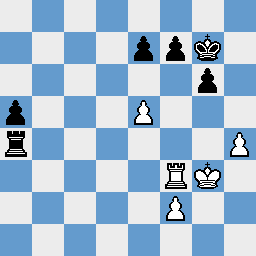
Re4! {Ensuring a two-pawn advantage, which usually makes even a rook endgame easy.} 36. Ra3 Rxe5 37. f3 Kf6 38. Ra4 Ke6 39. Rf4 Rf5 40. Re4+ Kd6 41. Rc4 Rb5 0-1
[Event "4NCL/D1/BRI1-GUI2"]
[Site "West Bromwich ENG"]
[Date "2004.11.20"]
[Round "3.7"]
[White "Sisask, Jesper"]
[Black "Richardson, Keith B"]
[Result "1-0"]
[ECO "A45"]
[WhiteElo "2166"]
[BlackElo "2220"]
[PlyCount "85"]
[EventDate "2004.11.20"]
[SourceDate "2004.09.21"]
1. d4 Nf6 2. Bg5 Ne4 3. Bf4 c5 4. f3 Qa5+ 5. c3 Nf6 6. d5 d6 {This line leads to a pawn structure reminiscent of a Schmid Benoni, although with the difference that white has not played c4 yet. This proves important.} 7. e4 g6 8. Nd2 Bg7 9. Nc4 Qd8 10. a4 O-O 11. Qd2
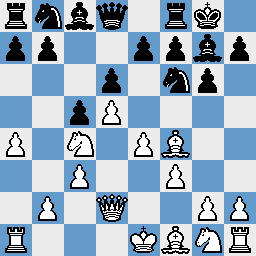
Na6 {Black plans to manouevre the knight to c7, but it's not entirely clear that it is well-placed there. An alternative plan, and possibly a better one, is to play ...Nh5 and ...f5, attacking the white centre at its weakest point.} 12. Ne2 Nc7 13. Ng3 b6 14. Be2 Ba6 15. O-O Bxc4 16. Bxc4 a6 {Black will now get in the thematic ...b5 advance, but where he goes from there is obscure.} 17. Bh6 b5 18. Bxg7 Kxg7 19. Be2 Qd7 20. f4
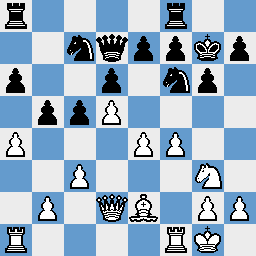
bxa4? (e6 {was probably called for - the text allows white to drive a wedge into black's position.}) 21. Bd1 Nb5 22. e5 Ng8 (dxe5 23. fxe5 Nxd5 24 c4 +-) 23. Bxa4 Qc7 24. Rae1 Rab8 25. e6 f5 {Exchanging pawns would give black a weak e-pawn to add to his other troubles.} 26. Rf2 Qa5 {White has the simple plan of training all his pieces on f5 and then playing g4 to open the kingside up. Black cannot seriously stop this, so he plays for counterplay on the queenside.} 27. Bd1 Nc7 28. Nf1 Nf6 29. Bf3 Qa2 30. Ne3 Rb6 31. Rc1 Rfb8
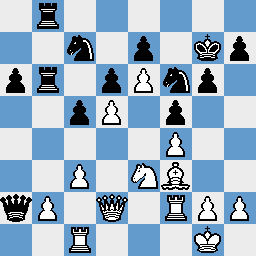
32. Rc2 {This move pretty much ends the counterplay - black can't bring another piece in to attack b2, and white can play c4 at any time to bolster d5.} Qa4 33. c4 Qb4 34. Qe2 Rf8 35. h3 Rbb8 36. g4 {The thematic advance can now be played, and black has to take it.} fxg4 (Ng8 37. gxf5 gxf5 38. Rg2+ Kh8 39. Nxf5! Rxf5 40. Be4 Rxf4 41. Bxh7! {wins.}) 37. hxg4 h6 38. g5 Ng8 (hxg5 39. f5 {and the d3-g6 diagonal will be the key line for white's invasion}) 39. gxh6+ Nxh6 40. Be4 Ne8 41. Rg2 Rf6
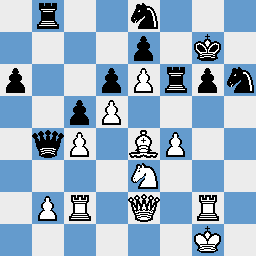
42. Qh5! Qe1+ 43. Kh2 1-0
[Event "4NCL/Div2/BRI2-PY"]
[Site "West Bromwich"]
[Date "2004.11.20"]
[Round "3.6"]
[White "Eckersley-Waites, Tom"]
[Black "Bareham, David"]
[Result "0-1"]
[ECO "B78"]
[WhiteElo "2114"]
[BlackElo "2115"]
[PlyCount "46"]
[EventDate "2004.11.20"]
1. e4 c5 2. Nf3 d6 3. d4 cxd4 4. Nxd4 Nf6 5. Nc3 g6 6. Be3 Bg7 7. f3 O-O 8. Qd2 Nc6 9. Bc4 Bd7 10. O-O-O Rc8 11. Bb3 Ne5 12. Kb1 {Up to now, this has been an utterly unremarkable Yugoslav attack. The text aims to safeguard the white king before pressing on with h4-h5.} Nc4 13. Bxc4 Rxc4 14. g4 Qc7
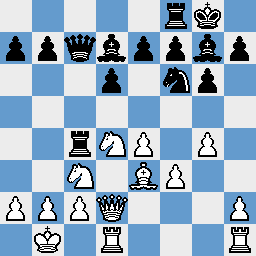
15. g5? {What was this aimed at? With one stroke, white closes off all hopes of a kingside attack. Surely (15. h4) was the move.} Nh5 16. Nd5 Qd8 17. b3 Rc8 18. Ne2 Be6 19. Bxa7?? (19. Nef4 {was indicated. The text drops a piece.}) Bxd5 20. exd5 (20. Qxd5 Qc7 {threatens mate, winning a vital tempo to play ...b6}) b6 21. Qe3 Qc7 22. Nd4 Qxa7 23. Nc6
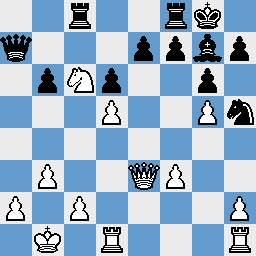
Qxa2+ 0-1
[Event "4NCL/D1/GUI1-BRI1"]
[Site "West Bromwich ENG"]
[Date "2004.11.21"]
[Round "4.8"]
[White "Ashby, Ann Marie"]
[Black "Lalic, Susan"]
[Result "1-0"]
[ECO "C00"]
[WhiteElo "2105"]
[BlackElo "2364"]
[PlyCount "111"]
[EventDate "2004.11.21"]
[SourceDate "2004.09.21"]
1. e4 e6 2. Nf3 d5 3. e5 c5 4. b4!? {An interesting gambit; I'm not sure of its soundness, but it is certainly good for worrying a stronger opponent.} cxb4 5. a3 Nc6 6. axb4 Bxb4 7. c3 Be7 8. d4 Nh6 9. Bd3 Nf5
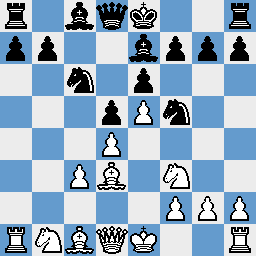
10. g4 {White plunges straight in with a pawn storm on the kingside. Another way to play these types of positions is to play Ba3 and hope black, despite her extra pawn, will have no counterplay because d4 is unattackable.} Nh4 11. Nxh4 Bxh4 12. O-O Bd7 13. f4 Be7 {White was threatening to trap the bishop with g5, so this retreat was forced.} 14. Qe2 g6 15. Na3 a6 16. Nc2 Na5
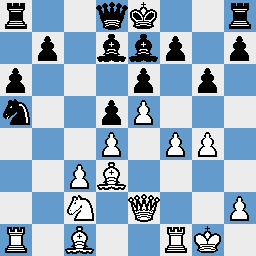
17. Rb1 (17. f5!? {looks interesting, but perhaps premature: }Nb3 18. fxg6 hxg6 19. Qf2 Rh7! {holds.}) Rc8 18. f5 Rxc3! {Black shows her willingness to sacrifice the exchange with this move, but anything else leaves white with a raging attack. 19. fxg6 hxg6 20. Qf3 O-O 21. Bh6 {wins the exchange, but as black already has two pawns, this is an even trade.} Bg5 22. Bxf8 Qxf8 23. Qe2 Qh6
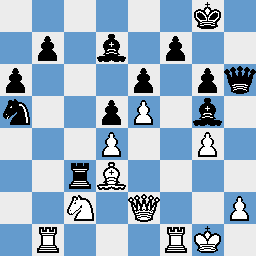
{This does not look good for white; her attacking chances have practically vanished and her pawns are desparately weak.} 24. Rf3 Rc7 25. Rbf1 Be8 26. Qg2 Nc4 27. Rh3 Qg7 28. Rf2 Nb2 29. Bf1 b5 30. Ra3 Na4 {The past few moves have increased black's advantage; the rather simple and direct plan here should be to advance the passed pawns on the queenside.} 31. Qg3 Bc1 32. Ra2 Qh6 33. Rf3 Qd2 34. Qf2 Qxf2+ 35. Rxf2
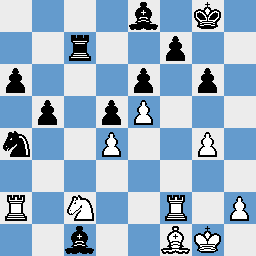
Rc3 {this can't be a bad move, but (a5) surely came into consideration, as white can't safely play Na3 here.} 36. Kg2 Rc6? {Allowing white to untangle her pieces. Again, (a5) was called for.} 37. Nb4 Rc8 38. Rac2 Rxc2 39. Rxc2
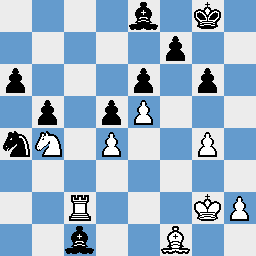
{Suddenly the position has changed beyond recognition - the swap of heavy pieces has switched the initiative to white.} Bb2 40. Rc8 Kf8 41. Nxa6 Nb6 42. Rb8 Nd7 {(=)} 43. Rb7 {White decides to avoid the repetition, seeing that she can win a piece with the pin.} Bxd4 44. Bxb5 Nxe5 45. Rb8 Nxg4 46. Rxe8+ Kg7
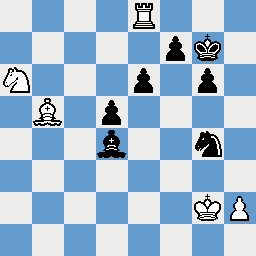
{This material advantage is not always easy to win, but the pawns are so far back that black must be lost here.} 47. Nb4 Ne3+ 48. Kf3 Nf5 49. Ba6 Nd6 50. Rd8 Ne4 51. Nd3 Kf6 52. Bb5! {Spotting that f7 is the weak spot in the pawn chain, and redeploying the pieces to attack it.} Kf5 53. Be8 f6 54. h4 {And now the attention switches to g6; the text was necessary to guard g5.} Nd2+ 55. Ke2 Nc4 56. Bf7 {This will be followed by Rg8, and white's h-pawn will run home.} 1-0
[Event "4NCL/D2/WR-BRI2"]
[Site "Rd04-West Bromwich"]
[Date "2004.11.21"]
[Round "4.2"]
[White "Collier, David O"]
[Black "Gayson, Peter M"]
[Result "1-0"]
[ECO "A80"]
[WhiteElo "2168"]
[BlackElo "2256"]
[PlyCount "129"]
[EventDate "2004.11.21"]
[Source "4NCL"]
[SourceDate "2004.11.24"]
1. d4 f5 2. Nc3 d5 3. Bf4 {White exploits black's rather commital move-order by clamping down on the e5 square, with the idea of exchanging off black's good bishop later on.} Nf6 4. e3 e6 5. a3 c6 6. Bd3 Bd6 7. Nce2
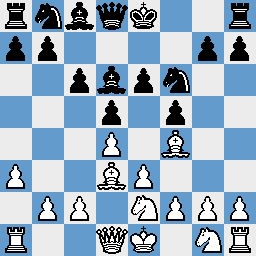
b5?! {I don't like the look of this; black is giving himself weaknesses on the dark squares with no obvious pawn breaks to lessen their impact. It might have been better to play (Qc7 8. Nf3 Nbd7), aiming for ...e5} 8. Nf3 O-O 9. O-O Qc7 10. Bxd6 Qxd6 11. Ne5 {An alternative idea is to play b3 and c4.} Nbd7 12. f4 Ne4 13. Nxd7 Bxd7 14. Nc1 {Eyeing up the weak squares on c5 and e5.} Rf6 15. Nb3 Raf8
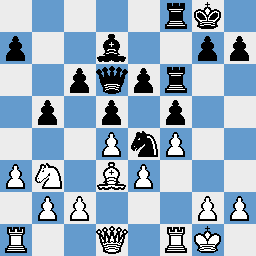
16. a4! {Leaving black with a horrible decision to make. Either he allows white the a-file in addition to his other positional trumps, or he leaves his pawn stranded on b4 - a kind of reversed backward pawn.} b4 17. a5 Kh8 18. Qe1 Rh6 19. Bxe4 fxe4 20. Nc5 Rb8 (g5 21. Nxd7 Qxd7 22. fxg5) 21. b3 Rf6 22. Ra4 {Winning the b-pawn.} Rb5 (Rxa5 23. Nxd7 Qxd7 24. Rb8+) 23. Rxb4 Be8 24. g3 Qb8 25. Na6 Qb7 26. Rxb5 cxb5 {Terrible though black's bishop is, he has no chances of counterplay at all if he lets it get exchanged off. At least the text gives him chances of getting it into an attack on the white king.} 27. Nc5 Qc6
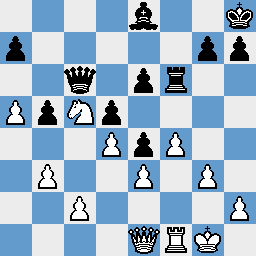
28. a6! {Stranding a second black b-pawn, and threatening Qe1-a5-d8.} Qb6 29. Qb4 Bh5? {Black is losing anyway, but giving up the exchange is hardly the way to create counter-chances. Having said that, Rb1 and c4 is a hard plan to meet.} 30. Nd7 Qd8 31. Nxf6 Qxf6 32. Qxb5 h6 33. Qb8+ Kh7 34. Qxa7 Qf5
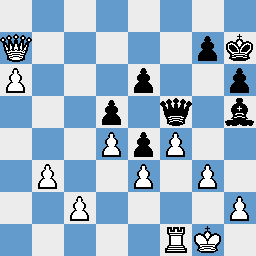
35. Qc7? {White starts to go slightly wrong here. Put the queen on b7 instead and black can resign - the pawn is unstoppable.} Be2 36. Re1 Qh5 (Bxa6? 37. Qc6 {wins the bishop}) 37. Qc3? {(37. a7!) was simpler - black can't stop the pawn queening, and white can bring the queen back in response to black's reply.} Bxa6 38. Qd2 Qf3 39. Qf2 Qg4 40. Qg2 Qg6 {Time control reached, it is clear that white 's material advantage is enough for a win, but the loss of the a-pawn has rendered it non-trivial.} 41. Ra1 Bb5 42. Ra5 Qe8 43. c4! {Exploiting the overloaded nature of the d-pawn.} Bc6 44. Rc5 Qa8 45. Qd2 Qa1+ 46. Kg2 Be8
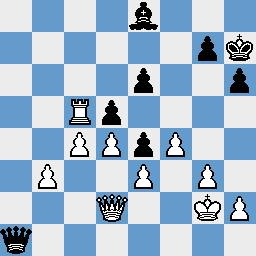
47. g4! {Destroying the power of the black bishop.} h5 48. h3 Qb1 {Black might have done better to exchange kingside pawns here, as in the game he loses the h-pawn.} 49. cxd5 exd5 50. Rxd5 Qxb3 51. Re5 Bb5 52. Rxh5+ Kg8
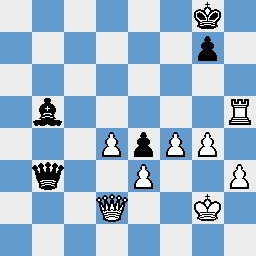
53. Rxb5! {The simplest, exchanging off into a winning queen ending.} Qxb5 54. d5 Kf7 55. d6 Ke8 56. Qc2 Qb4 57. f5 Kf7 (Qxd6 58. Qxe4+ Kf8){might prolong the agony for a while, but four pawns will beat one easily enough.} 58. Qa2+ Ke8 59. Qg8+ Kd7 60. Qxg7+ Kc6 61. Qd4 Qb1 62. d7 Qb2+ 63. Kg3 Qb1
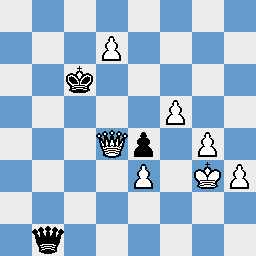
64. d8=N+ {There isn't a perpetual anyway, but white isn't taking any chances.} Kb5 65. Qd5+ {Forcing the black queen off.} 1-0
|
|
Division 1
WGHK 1
Pride and Prejudice
Barbican 4NCL 1
White Rose 1
WGHK 2
Guildford-A&DC 1
Cambridge Univ. 1
The ADs
Betsson.com
Barbican 4NCL 2
Oxford 1
Pandora's Box Grantham
S. Wales Dragons
Guildford-A&DC 2
Poisoned Pawns 1
Jutes of Kent
Division 2
Sambuca Sharks
Cheddleton
Warwickshire Select 1
e2e4.org.uk 1
Barbican 4NCL Youth
AMCA Dragons
Kings Head
Poisoned Pawns 2
Anglian Avengers
Wessex 1
Celtic Tigers 1
Bristol 1
White Rose 2
Brown Jack
Guildford-A&DC 3
FCA Solutions 1
Division 3
Rhyfelwyr Essyllwg
Sambuca Black Sheep
3Cs
Cambridge Univ. 2
Wessex 2
Warwickshire Select 2
KJCA Kings
FCA Solutions 2
The Full Ponty
Sussex Smart Ctls.
e2e4.org.uk 2
Iceni
Nottinghamshire 1
Nottinghamshire 2
Oxford 2
AMCA Rhinos
Braille Chess Assoc.
AMCA Hippos
Glos. Gambits
Bristol 2
KJCA Knights
Guernsey Mates
Bristol 3
SCS
Hackney
e2e4.org.uk 3
Beauty and the Beasts
Celtic Tigers 2
Oxford 3
Halesowen
Guildford-A&DC 4
AMCA Cheetahs
|

























